Waste Management in Construction Projects
VerifiedAdded on 2020/06/04
|9
|1887
|63
AI Summary
This assignment delves into the crucial topic of waste management within the context of construction projects. It examines various aspects, including efficient procurement of materials, substance flow analysis for planning, reverse logistics networks for municipal solid waste, and the significance of life cycle assessment in managing e-waste from construction sites. The emphasis is on understanding and implementing sustainable practices to minimize environmental impact.
Contribute Materials
Your contribution can guide someone’s learning journey. Share your
documents today.
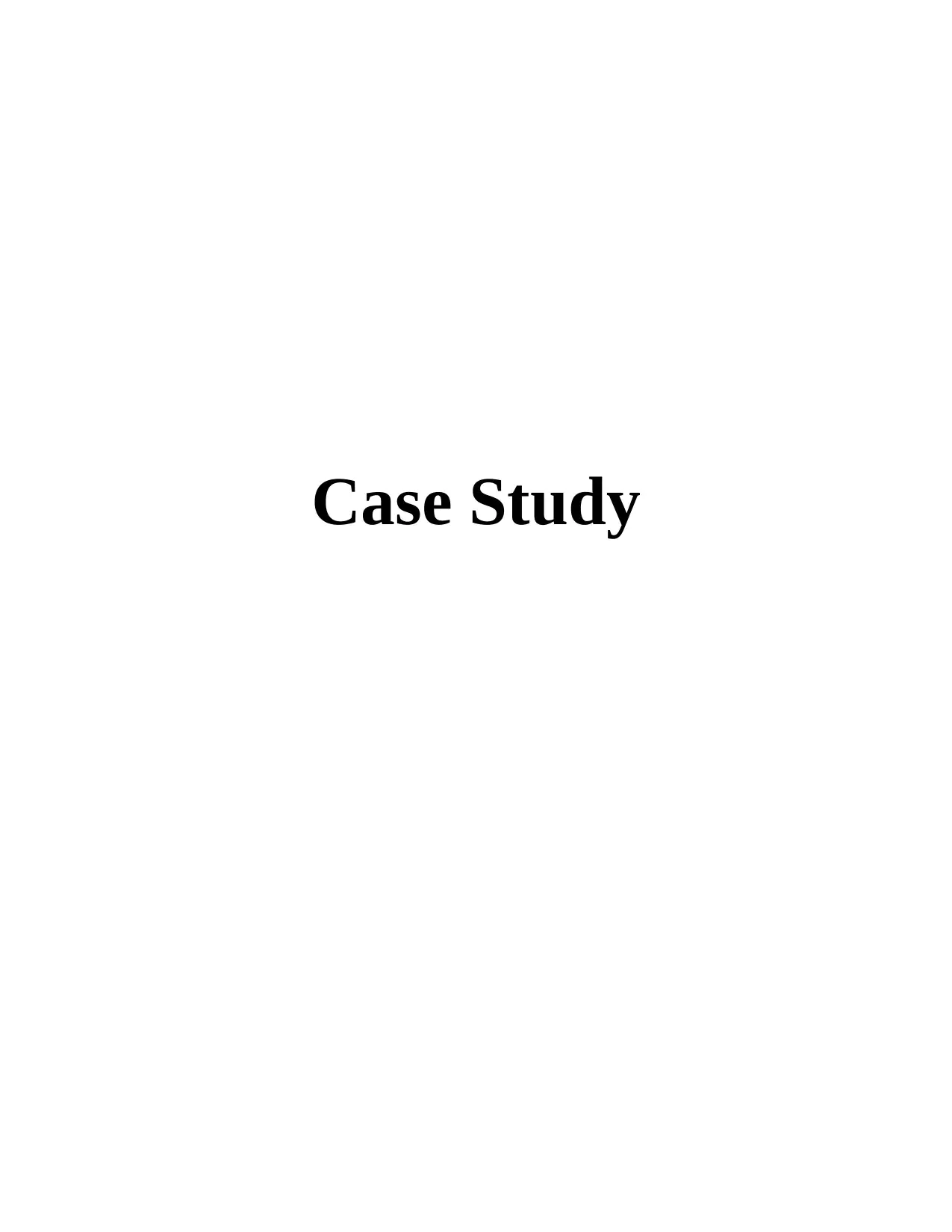
Case Study
Secure Best Marks with AI Grader
Need help grading? Try our AI Grader for instant feedback on your assignments.
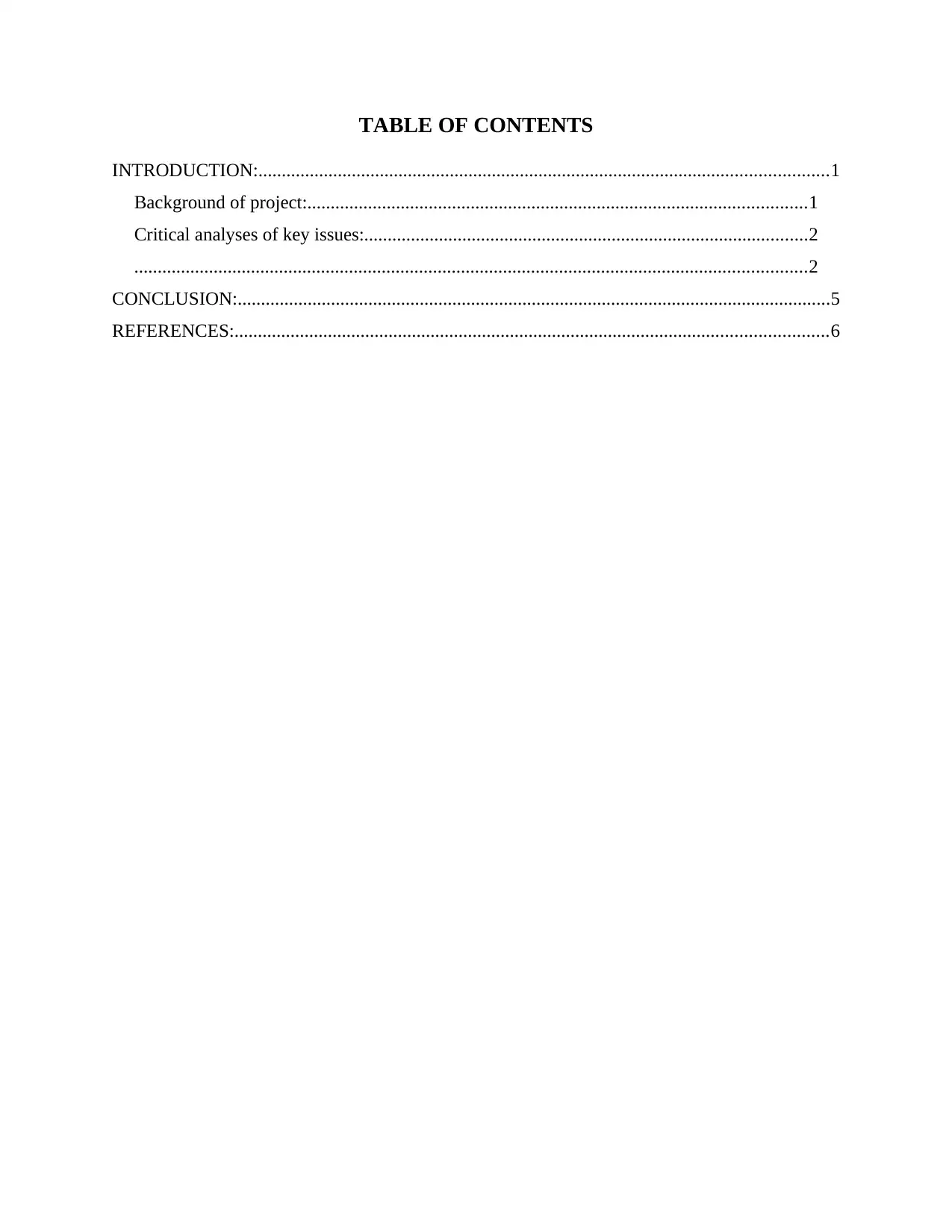
TABLE OF CONTENTS
INTRODUCTION:..........................................................................................................................1
Background of project:...........................................................................................................1
Critical analyses of key issues:...............................................................................................2
................................................................................................................................................2
CONCLUSION:...............................................................................................................................5
REFERENCES:...............................................................................................................................6
INTRODUCTION:..........................................................................................................................1
Background of project:...........................................................................................................1
Critical analyses of key issues:...............................................................................................2
................................................................................................................................................2
CONCLUSION:...............................................................................................................................5
REFERENCES:...............................................................................................................................6
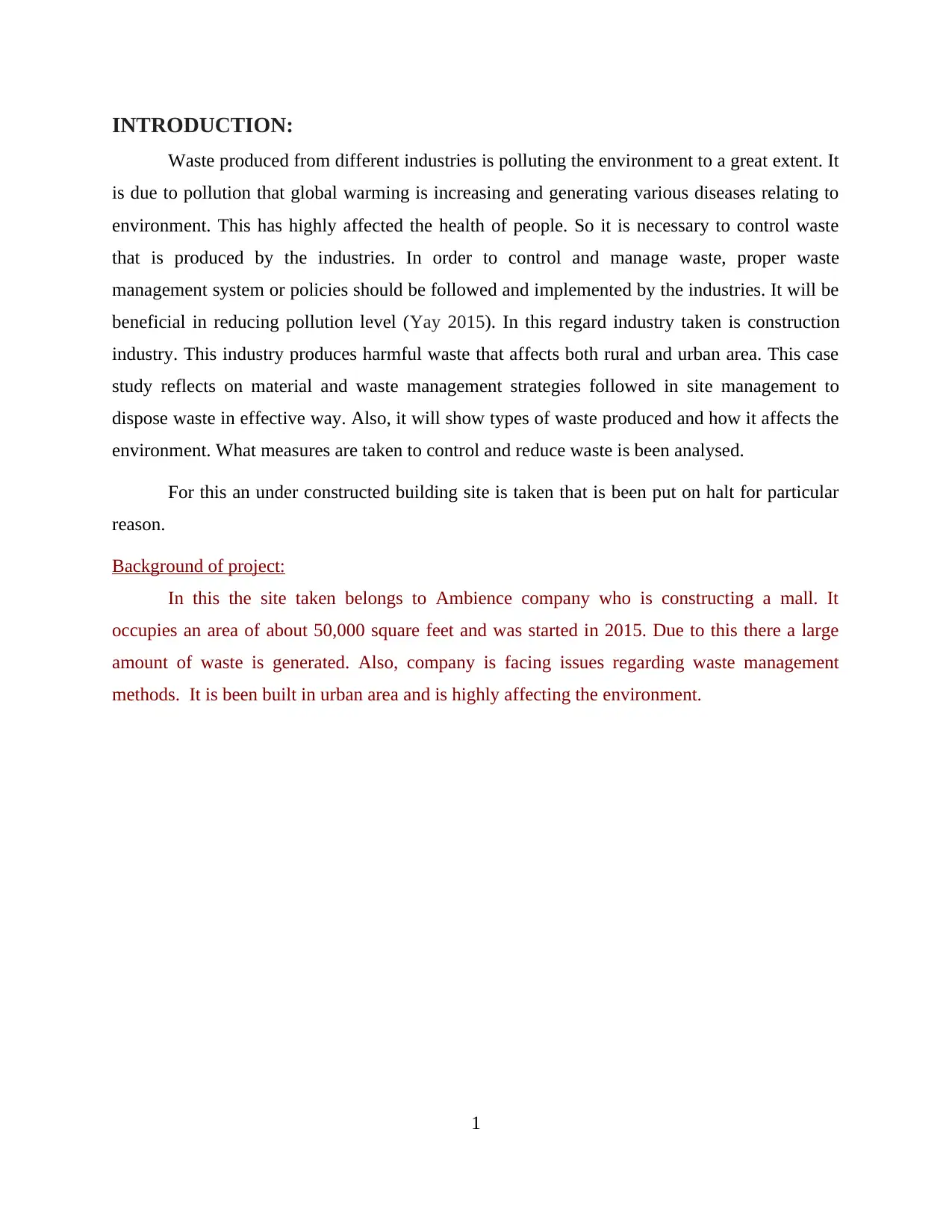
INTRODUCTION:
Waste produced from different industries is polluting the environment to a great extent. It
is due to pollution that global warming is increasing and generating various diseases relating to
environment. This has highly affected the health of people. So it is necessary to control waste
that is produced by the industries. In order to control and manage waste, proper waste
management system or policies should be followed and implemented by the industries. It will be
beneficial in reducing pollution level (Yay 2015). In this regard industry taken is construction
industry. This industry produces harmful waste that affects both rural and urban area. This case
study reflects on material and waste management strategies followed in site management to
dispose waste in effective way. Also, it will show types of waste produced and how it affects the
environment. What measures are taken to control and reduce waste is been analysed.
For this an under constructed building site is taken that is been put on halt for particular
reason.
Background of project:
In this the site taken belongs to Ambience company who is constructing a mall. It
occupies an area of about 50,000 square feet and was started in 2015. Due to this there a large
amount of waste is generated. Also, company is facing issues regarding waste management
methods. It is been built in urban area and is highly affecting the environment.
1
Waste produced from different industries is polluting the environment to a great extent. It
is due to pollution that global warming is increasing and generating various diseases relating to
environment. This has highly affected the health of people. So it is necessary to control waste
that is produced by the industries. In order to control and manage waste, proper waste
management system or policies should be followed and implemented by the industries. It will be
beneficial in reducing pollution level (Yay 2015). In this regard industry taken is construction
industry. This industry produces harmful waste that affects both rural and urban area. This case
study reflects on material and waste management strategies followed in site management to
dispose waste in effective way. Also, it will show types of waste produced and how it affects the
environment. What measures are taken to control and reduce waste is been analysed.
For this an under constructed building site is taken that is been put on halt for particular
reason.
Background of project:
In this the site taken belongs to Ambience company who is constructing a mall. It
occupies an area of about 50,000 square feet and was started in 2015. Due to this there a large
amount of waste is generated. Also, company is facing issues regarding waste management
methods. It is been built in urban area and is highly affecting the environment.
1
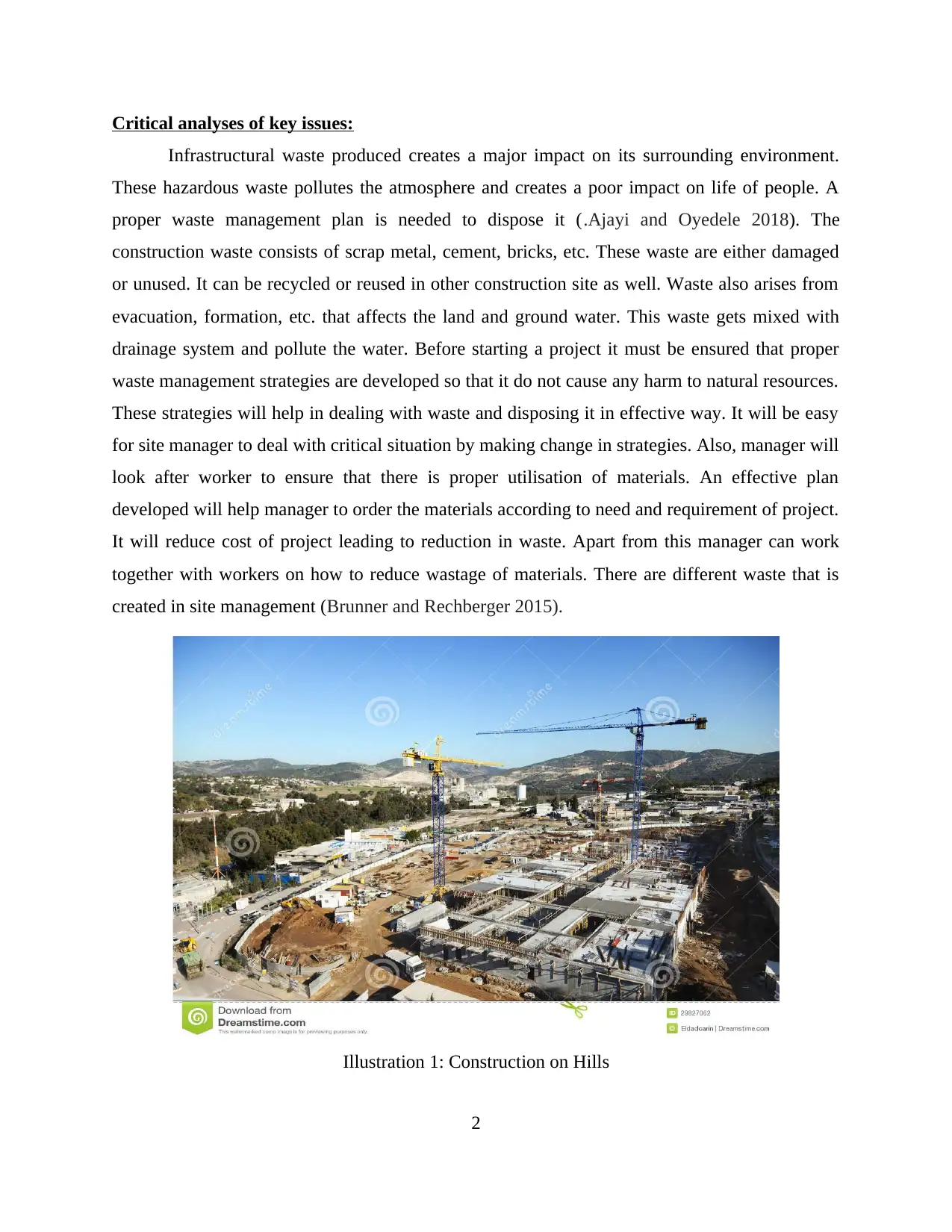
Critical analyses of key issues:
Infrastructural waste produced creates a major impact on its surrounding environment.
These hazardous waste pollutes the atmosphere and creates a poor impact on life of people. A
proper waste management plan is needed to dispose it (.Ajayi and Oyedele 2018). The
construction waste consists of scrap metal, cement, bricks, etc. These waste are either damaged
or unused. It can be recycled or reused in other construction site as well. Waste also arises from
evacuation, formation, etc. that affects the land and ground water. This waste gets mixed with
drainage system and pollute the water. Before starting a project it must be ensured that proper
waste management strategies are developed so that it do not cause any harm to natural resources.
These strategies will help in dealing with waste and disposing it in effective way. It will be easy
for site manager to deal with critical situation by making change in strategies. Also, manager will
look after worker to ensure that there is proper utilisation of materials. An effective plan
developed will help manager to order the materials according to need and requirement of project.
It will reduce cost of project leading to reduction in waste. Apart from this manager can work
together with workers on how to reduce wastage of materials. There are different waste that is
created in site management (Brunner and Rechberger 2015).
Illustration 1: Construction on Hills
2
Infrastructural waste produced creates a major impact on its surrounding environment.
These hazardous waste pollutes the atmosphere and creates a poor impact on life of people. A
proper waste management plan is needed to dispose it (.Ajayi and Oyedele 2018). The
construction waste consists of scrap metal, cement, bricks, etc. These waste are either damaged
or unused. It can be recycled or reused in other construction site as well. Waste also arises from
evacuation, formation, etc. that affects the land and ground water. This waste gets mixed with
drainage system and pollute the water. Before starting a project it must be ensured that proper
waste management strategies are developed so that it do not cause any harm to natural resources.
These strategies will help in dealing with waste and disposing it in effective way. It will be easy
for site manager to deal with critical situation by making change in strategies. Also, manager will
look after worker to ensure that there is proper utilisation of materials. An effective plan
developed will help manager to order the materials according to need and requirement of project.
It will reduce cost of project leading to reduction in waste. Apart from this manager can work
together with workers on how to reduce wastage of materials. There are different waste that is
created in site management (Brunner and Rechberger 2015).
Illustration 1: Construction on Hills
2
Secure Best Marks with AI Grader
Need help grading? Try our AI Grader for instant feedback on your assignments.
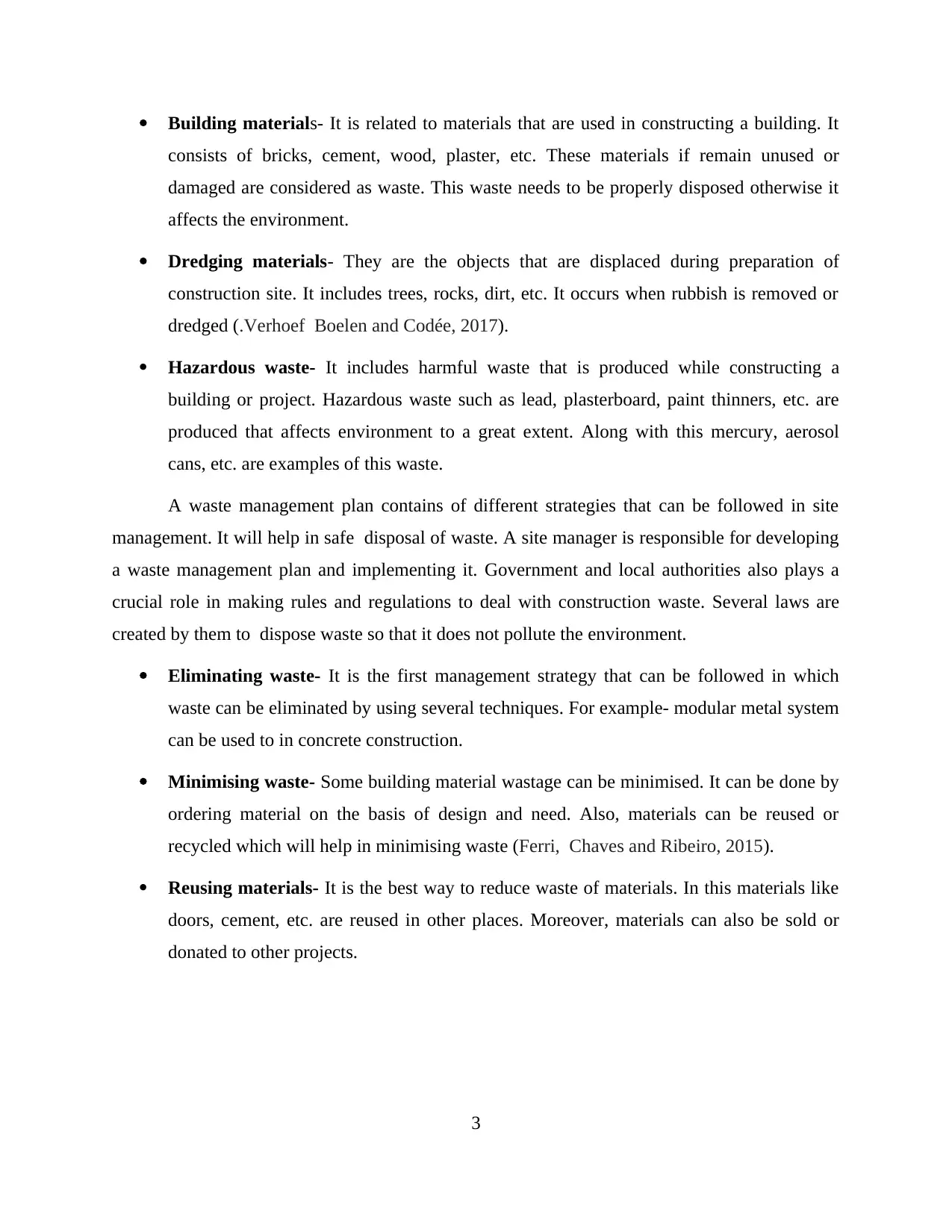
Building materials- It is related to materials that are used in constructing a building. It
consists of bricks, cement, wood, plaster, etc. These materials if remain unused or
damaged are considered as waste. This waste needs to be properly disposed otherwise it
affects the environment.
Dredging materials- They are the objects that are displaced during preparation of
construction site. It includes trees, rocks, dirt, etc. It occurs when rubbish is removed or
dredged (.Verhoef Boelen and Codée, 2017).
Hazardous waste- It includes harmful waste that is produced while constructing a
building or project. Hazardous waste such as lead, plasterboard, paint thinners, etc. are
produced that affects environment to a great extent. Along with this mercury, aerosol
cans, etc. are examples of this waste.
A waste management plan contains of different strategies that can be followed in site
management. It will help in safe disposal of waste. A site manager is responsible for developing
a waste management plan and implementing it. Government and local authorities also plays a
crucial role in making rules and regulations to deal with construction waste. Several laws are
created by them to dispose waste so that it does not pollute the environment.
Eliminating waste- It is the first management strategy that can be followed in which
waste can be eliminated by using several techniques. For example- modular metal system
can be used to in concrete construction.
Minimising waste- Some building material wastage can be minimised. It can be done by
ordering material on the basis of design and need. Also, materials can be reused or
recycled which will help in minimising waste (Ferri, Chaves and Ribeiro, 2015).
Reusing materials- It is the best way to reduce waste of materials. In this materials like
doors, cement, etc. are reused in other places. Moreover, materials can also be sold or
donated to other projects.
3
consists of bricks, cement, wood, plaster, etc. These materials if remain unused or
damaged are considered as waste. This waste needs to be properly disposed otherwise it
affects the environment.
Dredging materials- They are the objects that are displaced during preparation of
construction site. It includes trees, rocks, dirt, etc. It occurs when rubbish is removed or
dredged (.Verhoef Boelen and Codée, 2017).
Hazardous waste- It includes harmful waste that is produced while constructing a
building or project. Hazardous waste such as lead, plasterboard, paint thinners, etc. are
produced that affects environment to a great extent. Along with this mercury, aerosol
cans, etc. are examples of this waste.
A waste management plan contains of different strategies that can be followed in site
management. It will help in safe disposal of waste. A site manager is responsible for developing
a waste management plan and implementing it. Government and local authorities also plays a
crucial role in making rules and regulations to deal with construction waste. Several laws are
created by them to dispose waste so that it does not pollute the environment.
Eliminating waste- It is the first management strategy that can be followed in which
waste can be eliminated by using several techniques. For example- modular metal system
can be used to in concrete construction.
Minimising waste- Some building material wastage can be minimised. It can be done by
ordering material on the basis of design and need. Also, materials can be reused or
recycled which will help in minimising waste (Ferri, Chaves and Ribeiro, 2015).
Reusing materials- It is the best way to reduce waste of materials. In this materials like
doors, cement, etc. are reused in other places. Moreover, materials can also be sold or
donated to other projects.
3
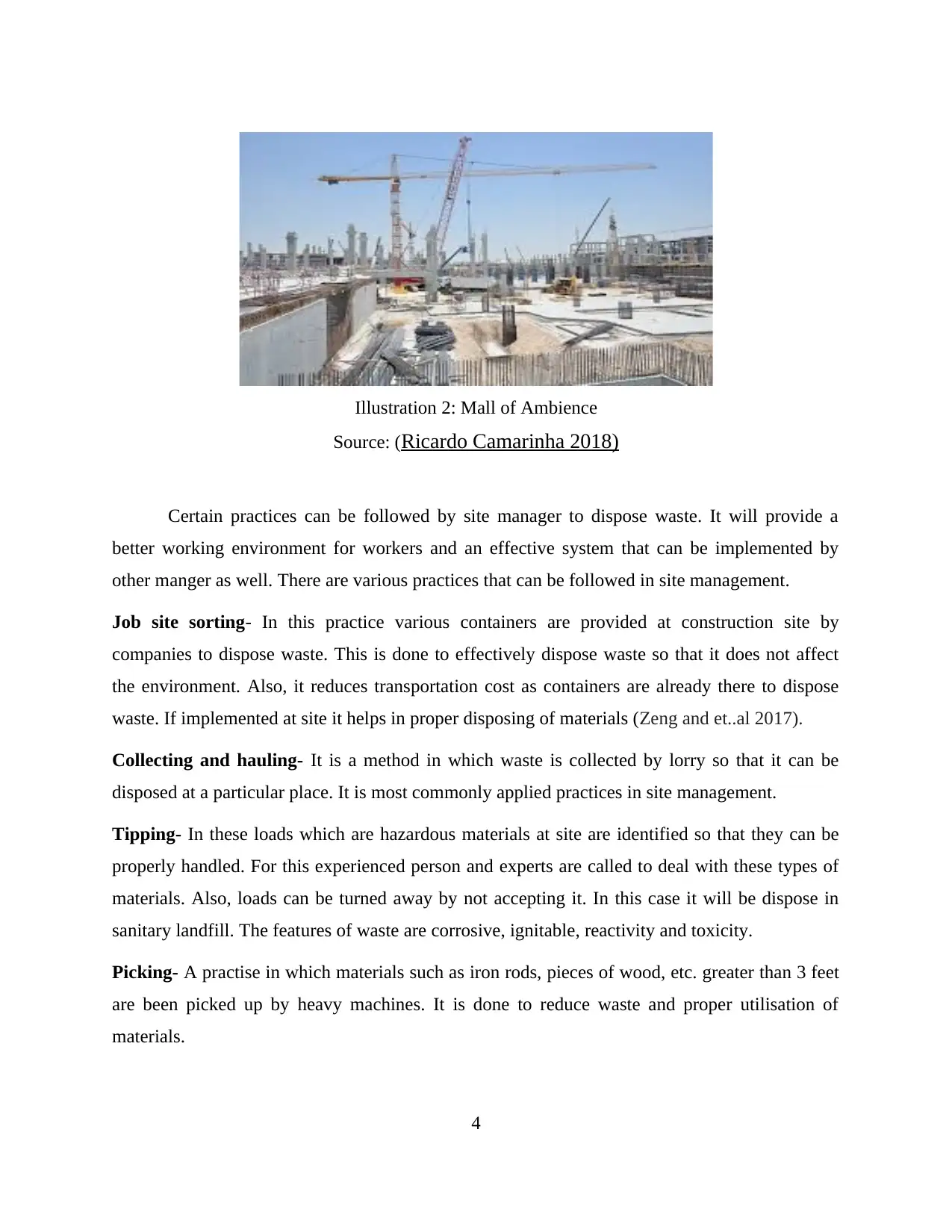
Certain practices can be followed by site manager to dispose waste. It will provide a
better working environment for workers and an effective system that can be implemented by
other manger as well. There are various practices that can be followed in site management.
Job site sorting- In this practice various containers are provided at construction site by
companies to dispose waste. This is done to effectively dispose waste so that it does not affect
the environment. Also, it reduces transportation cost as containers are already there to dispose
waste. If implemented at site it helps in proper disposing of materials (Zeng and et..al 2017).
Collecting and hauling- It is a method in which waste is collected by lorry so that it can be
disposed at a particular place. It is most commonly applied practices in site management.
Tipping- In these loads which are hazardous materials at site are identified so that they can be
properly handled. For this experienced person and experts are called to deal with these types of
materials. Also, loads can be turned away by not accepting it. In this case it will be dispose in
sanitary landfill. The features of waste are corrosive, ignitable, reactivity and toxicity.
Picking- A practise in which materials such as iron rods, pieces of wood, etc. greater than 3 feet
are been picked up by heavy machines. It is done to reduce waste and proper utilisation of
materials.
4
Illustration 2: Mall of Ambience
Source: (Ricardo Camarinha 2018)
better working environment for workers and an effective system that can be implemented by
other manger as well. There are various practices that can be followed in site management.
Job site sorting- In this practice various containers are provided at construction site by
companies to dispose waste. This is done to effectively dispose waste so that it does not affect
the environment. Also, it reduces transportation cost as containers are already there to dispose
waste. If implemented at site it helps in proper disposing of materials (Zeng and et..al 2017).
Collecting and hauling- It is a method in which waste is collected by lorry so that it can be
disposed at a particular place. It is most commonly applied practices in site management.
Tipping- In these loads which are hazardous materials at site are identified so that they can be
properly handled. For this experienced person and experts are called to deal with these types of
materials. Also, loads can be turned away by not accepting it. In this case it will be dispose in
sanitary landfill. The features of waste are corrosive, ignitable, reactivity and toxicity.
Picking- A practise in which materials such as iron rods, pieces of wood, etc. greater than 3 feet
are been picked up by heavy machines. It is done to reduce waste and proper utilisation of
materials.
4
Illustration 2: Mall of Ambience
Source: (Ricardo Camarinha 2018)
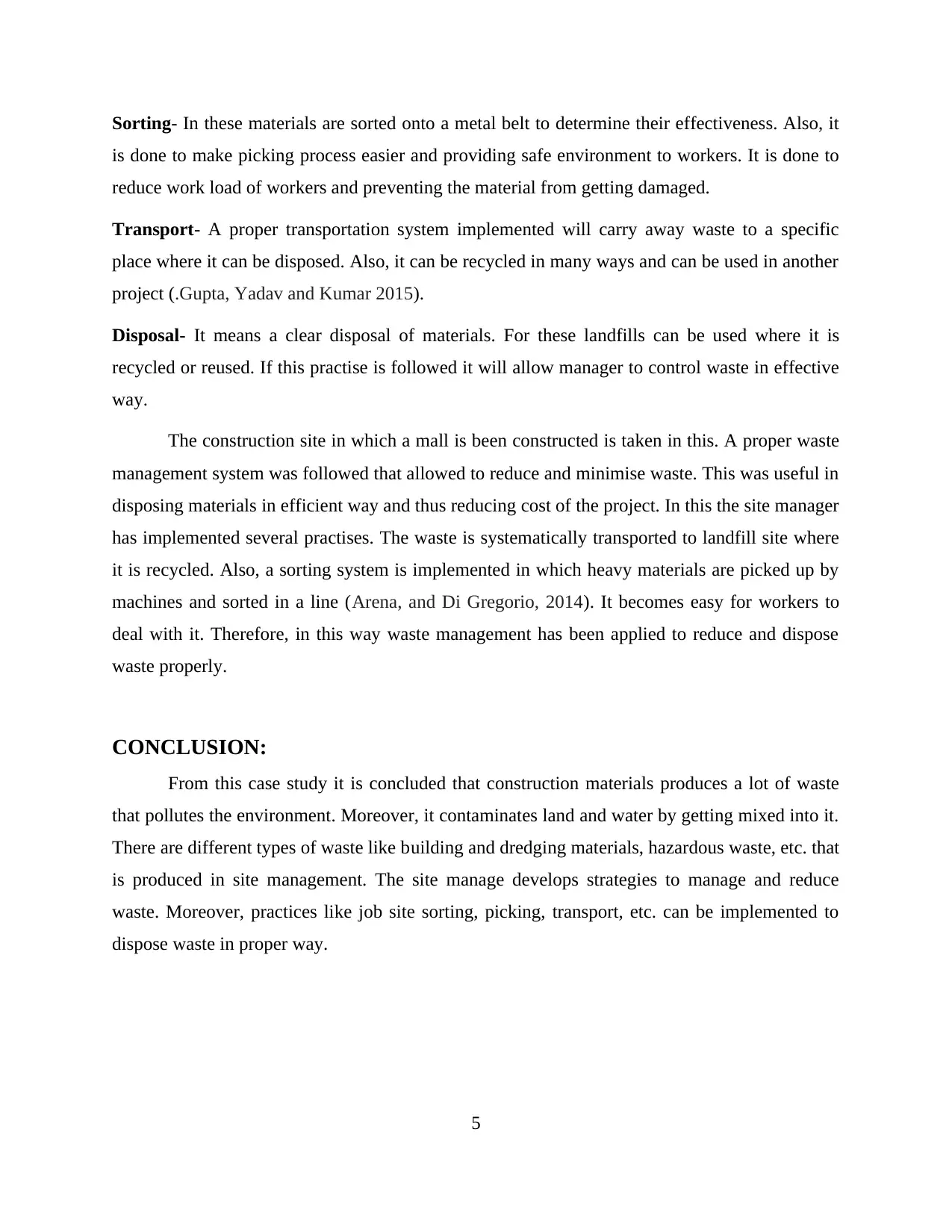
Sorting- In these materials are sorted onto a metal belt to determine their effectiveness. Also, it
is done to make picking process easier and providing safe environment to workers. It is done to
reduce work load of workers and preventing the material from getting damaged.
Transport- A proper transportation system implemented will carry away waste to a specific
place where it can be disposed. Also, it can be recycled in many ways and can be used in another
project (.Gupta, Yadav and Kumar 2015).
Disposal- It means a clear disposal of materials. For these landfills can be used where it is
recycled or reused. If this practise is followed it will allow manager to control waste in effective
way.
The construction site in which a mall is been constructed is taken in this. A proper waste
management system was followed that allowed to reduce and minimise waste. This was useful in
disposing materials in efficient way and thus reducing cost of the project. In this the site manager
has implemented several practises. The waste is systematically transported to landfill site where
it is recycled. Also, a sorting system is implemented in which heavy materials are picked up by
machines and sorted in a line (Arena, and Di Gregorio, 2014). It becomes easy for workers to
deal with it. Therefore, in this way waste management has been applied to reduce and dispose
waste properly.
CONCLUSION:
From this case study it is concluded that construction materials produces a lot of waste
that pollutes the environment. Moreover, it contaminates land and water by getting mixed into it.
There are different types of waste like building and dredging materials, hazardous waste, etc. that
is produced in site management. The site manage develops strategies to manage and reduce
waste. Moreover, practices like job site sorting, picking, transport, etc. can be implemented to
dispose waste in proper way.
5
is done to make picking process easier and providing safe environment to workers. It is done to
reduce work load of workers and preventing the material from getting damaged.
Transport- A proper transportation system implemented will carry away waste to a specific
place where it can be disposed. Also, it can be recycled in many ways and can be used in another
project (.Gupta, Yadav and Kumar 2015).
Disposal- It means a clear disposal of materials. For these landfills can be used where it is
recycled or reused. If this practise is followed it will allow manager to control waste in effective
way.
The construction site in which a mall is been constructed is taken in this. A proper waste
management system was followed that allowed to reduce and minimise waste. This was useful in
disposing materials in efficient way and thus reducing cost of the project. In this the site manager
has implemented several practises. The waste is systematically transported to landfill site where
it is recycled. Also, a sorting system is implemented in which heavy materials are picked up by
machines and sorted in a line (Arena, and Di Gregorio, 2014). It becomes easy for workers to
deal with it. Therefore, in this way waste management has been applied to reduce and dispose
waste properly.
CONCLUSION:
From this case study it is concluded that construction materials produces a lot of waste
that pollutes the environment. Moreover, it contaminates land and water by getting mixed into it.
There are different types of waste like building and dredging materials, hazardous waste, etc. that
is produced in site management. The site manage develops strategies to manage and reduce
waste. Moreover, practices like job site sorting, picking, transport, etc. can be implemented to
dispose waste in proper way.
5
Paraphrase This Document
Need a fresh take? Get an instant paraphrase of this document with our AI Paraphraser
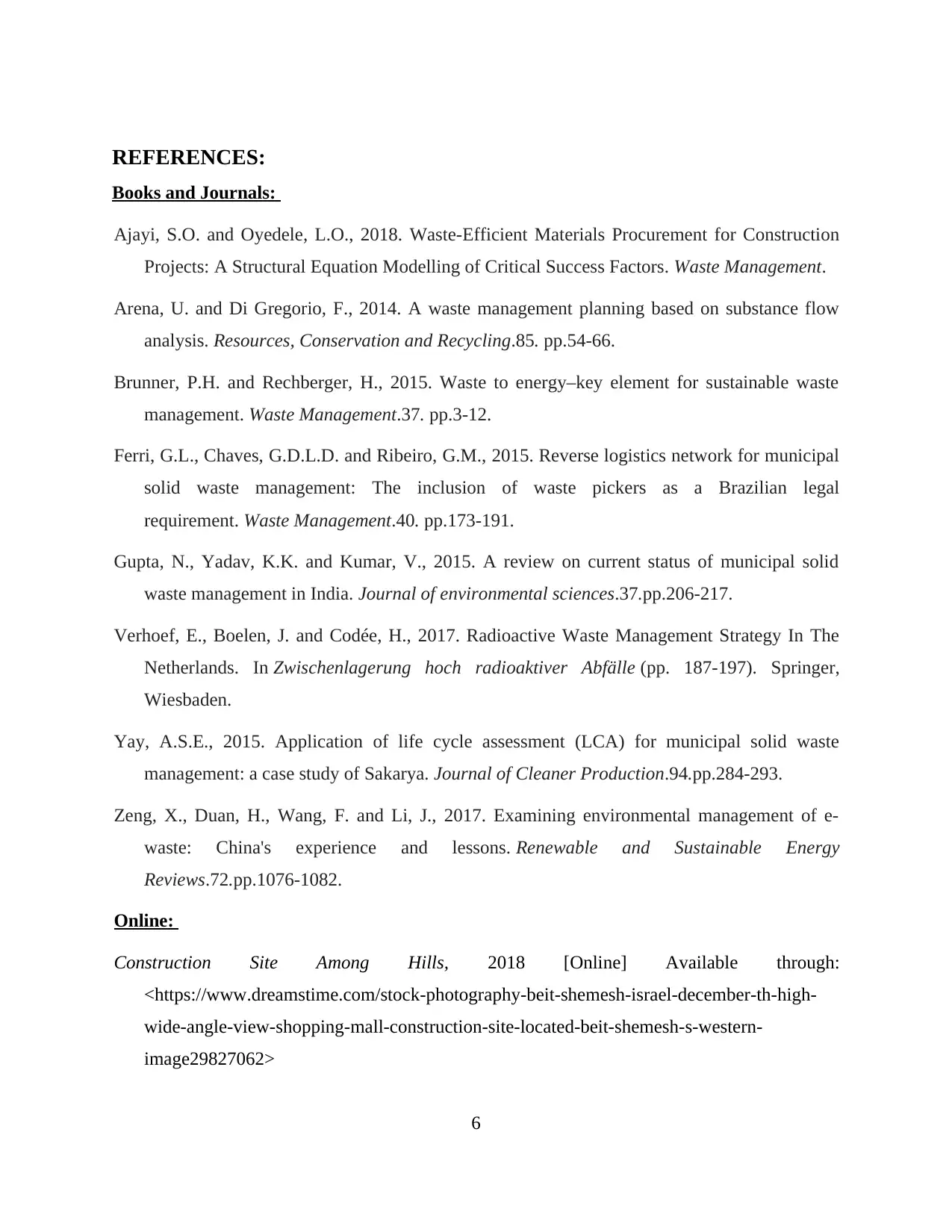
REFERENCES:
Books and Journals:
Ajayi, S.O. and Oyedele, L.O., 2018. Waste-Efficient Materials Procurement for Construction
Projects: A Structural Equation Modelling of Critical Success Factors. Waste Management.
Arena, U. and Di Gregorio, F., 2014. A waste management planning based on substance flow
analysis. Resources, Conservation and Recycling.85. pp.54-66.
Brunner, P.H. and Rechberger, H., 2015. Waste to energy–key element for sustainable waste
management. Waste Management.37. pp.3-12.
Ferri, G.L., Chaves, G.D.L.D. and Ribeiro, G.M., 2015. Reverse logistics network for municipal
solid waste management: The inclusion of waste pickers as a Brazilian legal
requirement. Waste Management.40. pp.173-191.
Gupta, N., Yadav, K.K. and Kumar, V., 2015. A review on current status of municipal solid
waste management in India. Journal of environmental sciences.37.pp.206-217.
Verhoef, E., Boelen, J. and Codée, H., 2017. Radioactive Waste Management Strategy In The
Netherlands. In Zwischenlagerung hoch radioaktiver Abfälle (pp. 187-197). Springer,
Wiesbaden.
Yay, A.S.E., 2015. Application of life cycle assessment (LCA) for municipal solid waste
management: a case study of Sakarya. Journal of Cleaner Production.94.pp.284-293.
Zeng, X., Duan, H., Wang, F. and Li, J., 2017. Examining environmental management of e-
waste: China's experience and lessons. Renewable and Sustainable Energy
Reviews.72.pp.1076-1082.
Online:
Construction Site Among Hills, 2018 [Online] Available through:
<https://www.dreamstime.com/stock-photography-beit-shemesh-israel-december-th-high-
wide-angle-view-shopping-mall-construction-site-located-beit-shemesh-s-western-
image29827062>
6
Books and Journals:
Ajayi, S.O. and Oyedele, L.O., 2018. Waste-Efficient Materials Procurement for Construction
Projects: A Structural Equation Modelling of Critical Success Factors. Waste Management.
Arena, U. and Di Gregorio, F., 2014. A waste management planning based on substance flow
analysis. Resources, Conservation and Recycling.85. pp.54-66.
Brunner, P.H. and Rechberger, H., 2015. Waste to energy–key element for sustainable waste
management. Waste Management.37. pp.3-12.
Ferri, G.L., Chaves, G.D.L.D. and Ribeiro, G.M., 2015. Reverse logistics network for municipal
solid waste management: The inclusion of waste pickers as a Brazilian legal
requirement. Waste Management.40. pp.173-191.
Gupta, N., Yadav, K.K. and Kumar, V., 2015. A review on current status of municipal solid
waste management in India. Journal of environmental sciences.37.pp.206-217.
Verhoef, E., Boelen, J. and Codée, H., 2017. Radioactive Waste Management Strategy In The
Netherlands. In Zwischenlagerung hoch radioaktiver Abfälle (pp. 187-197). Springer,
Wiesbaden.
Yay, A.S.E., 2015. Application of life cycle assessment (LCA) for municipal solid waste
management: a case study of Sakarya. Journal of Cleaner Production.94.pp.284-293.
Zeng, X., Duan, H., Wang, F. and Li, J., 2017. Examining environmental management of e-
waste: China's experience and lessons. Renewable and Sustainable Energy
Reviews.72.pp.1076-1082.
Online:
Construction Site Among Hills, 2018 [Online] Available through:
<https://www.dreamstime.com/stock-photography-beit-shemesh-israel-december-th-high-
wide-angle-view-shopping-mall-construction-site-located-beit-shemesh-s-western-
image29827062>
6
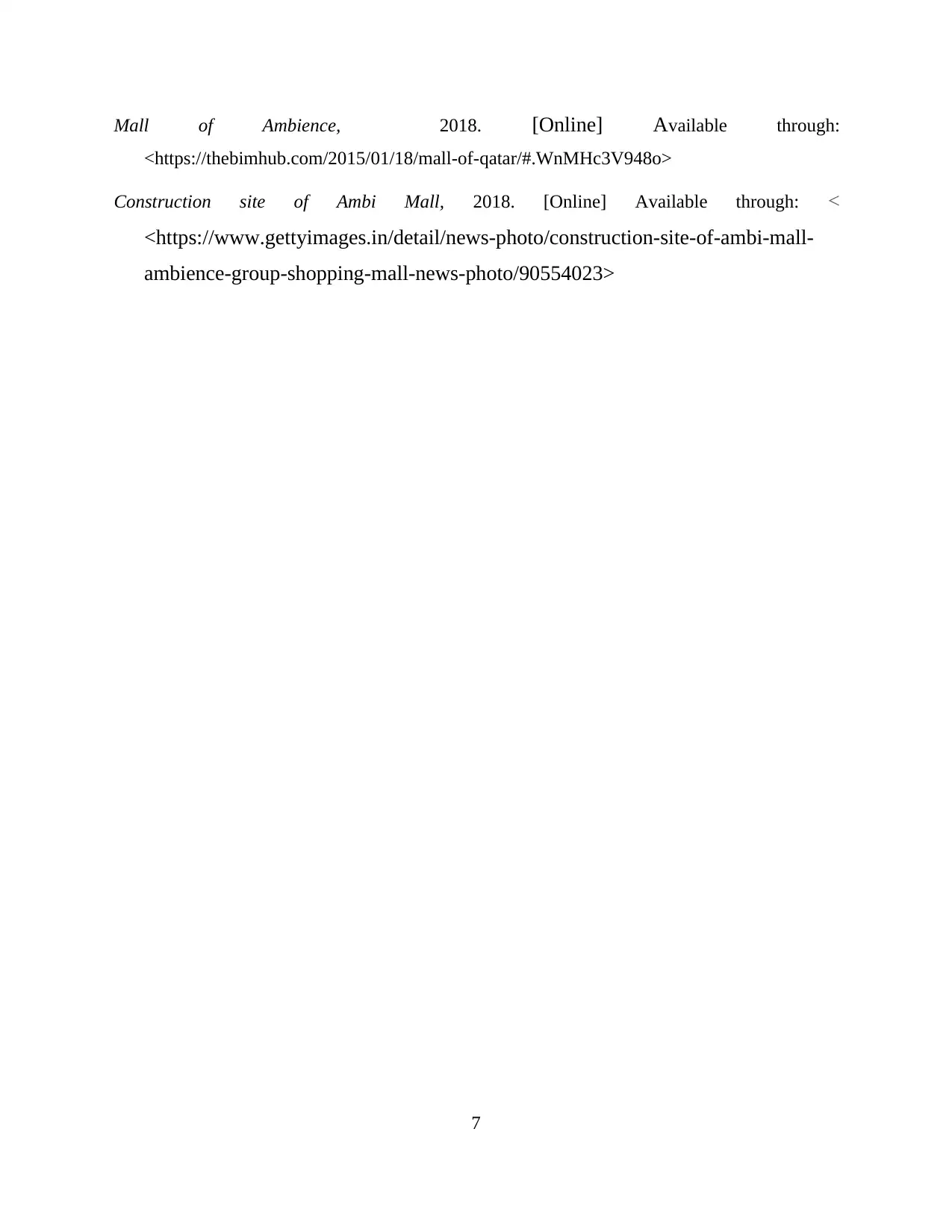
Mall of Ambience, 2018. [Online] Available through:
<https://thebimhub.com/2015/01/18/mall-of-qatar/#.WnMHc3V948o>
Construction site of Ambi Mall, 2018. [Online] Available through: <
<https://www.gettyimages.in/detail/news-photo/construction-site-of-ambi-mall-
ambience-group-shopping-mall-news-photo/90554023>
7
<https://thebimhub.com/2015/01/18/mall-of-qatar/#.WnMHc3V948o>
Construction site of Ambi Mall, 2018. [Online] Available through: <
<https://www.gettyimages.in/detail/news-photo/construction-site-of-ambi-mall-
ambience-group-shopping-mall-news-photo/90554023>
7
1 out of 9
Related Documents
Your All-in-One AI-Powered Toolkit for Academic Success.
+13062052269
info@desklib.com
Available 24*7 on WhatsApp / Email
![[object Object]](/_next/static/media/star-bottom.7253800d.svg)
Unlock your academic potential
© 2024 | Zucol Services PVT LTD | All rights reserved.




